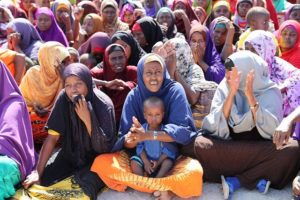Conflict, drought and floods have pushed a record number of Somalis into Mogadishu, making it Africa’s most crowded city, the Internal Displacement Monitoring Centre said on Tuesday. With more than 340,000 people forced to flee their homes in the first half of 2018, the year is likely to produce Somalia’s highest number of displacements in a decade, said the Geneva-based center, part of the Norwegian Refugee Council (NRC).
“Somali families are fleeing to Mogadishu seeking shelter, protection and aid,” Evelyn Aero, the NRC aid agency’s regional adviser, told the Thomson Reuters Foundation. “With nowhere else to go, crowding into these camps means that they will be living in unhealthy environment that is unsafe.” Somalia has been trying to recover from conflict that engulfed the country in 1991, when clan warlords overthrew a dictator and then turned on each other. Over the past decade it has faced an insurgency waged by al Qaeda-linked al Shabaab.
While parts of Somalia are plagued by militant violence, a degree of stability in the capital, Mogadishu, and the prospect of humanitarian assistance, attract the rural poor. Some 2.6 million people live in Mogadishu, with more than 28,000 people per square kilometer, making the Indian Ocean city the second most densely populated in the world after Dhaka in Bangladesh, NRC said, citing the website Demographia.
Erratic rainfall, prolonged drought, floods and difficulties accessing markets continue to drive rural Somalis into urban areas, following a 2011 famine which killed 260,000 people. “We are continuing to observe new internally displaced families arriving in Mogadishu,” said Melaki Yirga, deputy regional director for the charity Mercy Corps.
“These women, men and children have very little access to humanitarian support such as basic food.” About 600,000 displaced people live across Mogadishu, with many families evicted multiple times as developers, buoyed by a construction boom, seek to build on land where informal settlements have sprung up, NRC said.








